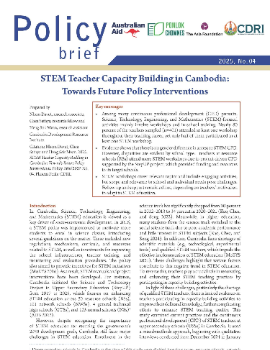
STEM Teacher Capacity Building in Cambodia: Towards Future Policy Interventions
Among many continuous professional development (CPD) pursuits, Science, Technology, Engineering, and Mathematics (STEM)-focused activities mainly involve workshops and in-school training. Nearly 80 percent of the teachers sampled (n=401) attended at least one workshop throughout their teaching career, yet only half of them participated in at least...
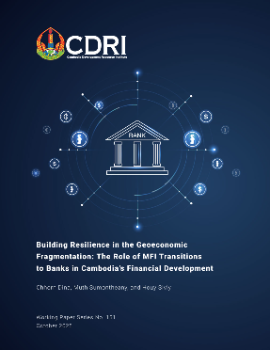
Building Resilience in the Geoeconomic Fragmentation: The Role of Transitioning MFIs to Banks in Cambodia’s Financial Development
In a geoeconomic fragmentation, Cambodia’s financial sector faces the urgent challenge of enhancing inclusion while safeguarding stability. The transition of microfinance institutions (MFIs) into banks marks a potential pivotal step toward resilience, offering opportunities to expand financial inclusion and absorb external shocks. This study an...
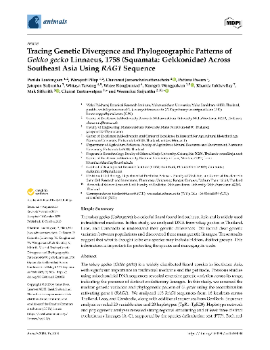
Tracing Genetic Divergence and Phylogeographic Patterns of Gekko gecko Linnaeus, 1758 (Squamata: Gekkonidae) Across Southeast Asia Using RAG1 Sequence
The tokay gecko (Gekko gecko) is a widely distributed lizard species in Southeast Asia, with significant importance in traditional medicine and the pet trade. Previous studies using mitochondrial DNA sequences revealed extensive genetic variation across its range, indicating the presence of distinct evolutionary lineages. In this study, we asse...
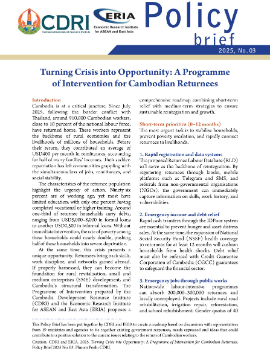
Turning Crisis into Opportunity: A Programme of Intervention for Cambodian Returnees
Following the 2025 border conflict with Thailand, nearly one million Cambodian migrant workers have returned home, threatening rural livelihoods and national stability. This policy brief outlines a comprehensive intervention program developed by CDRI and ERIA to address the crisis. It proposes immediate relief through cash transfers, job creation,...
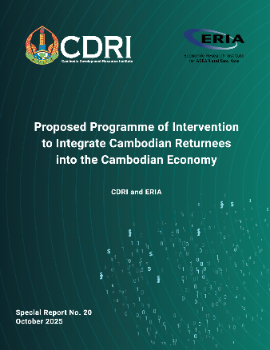
Proposed Programme of Intervention to Integrate Cambodian Returnees into the Cambodian Economy
In response to the mass return of over 910,000 Cambodian migrant workers from Thailand in 2025, this report by CDRI and ERIA outlines a comprehensive intervention programme to address the resulting economic and social challenges. The programme proposes short-term measures such as emergency cash transfers, debt relief, public works employment, and s...
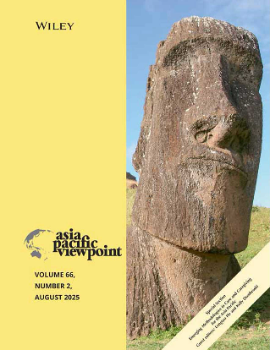
From Loss to Transformation? Towards Pluralistic and Politicised Agrarian-Climate Futures
Understanding how actors perceive and anticipate future states of the world is gaining traction in climate change governance scholarship and related calls for sustainability transformations. However, smallholder farmers, indigenous groups, and local communities, who are expected to bear disproportionate burdens of loss and damage from climate c...
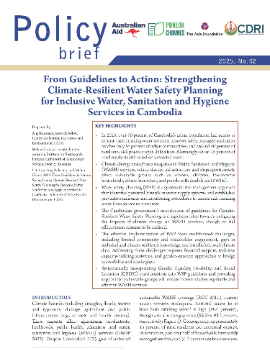
From Guidelines to Action: Strengthening Climate-Resilient Water Safety Planning for Inclusive Water, Sanitation and Hygiene Services in Cambodia
In 2023, over 90 percent of Cambodia’s urban population had access to at least basic drinking water services; however safely managed sanitation reaches only 56 percent of urban communities, and around 10 percent of rural ones still practice open defecation. Alarmingly, about 15 percent of rural residents still relied on untreated water.Climate...
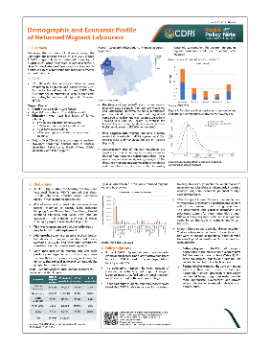
Demographic and Economic Profile of Returned Migrant Labourers
Following the outbreak of violence along the Cambodia–Thailand border on 24 July 2025, around 910,000 migrant labourers returned home by 11 August 2025, losing their main source of income. A clear picture of returnees’ demographic and economic profiles is essential for designing timely and effective support measures.To explore more insights, visit...
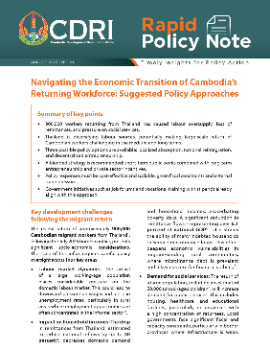
Navigating the Economic Transition of Cambodia’s Returning Workforce: Suggested Policy Approaches
900,000 workers returning from Thailand has caused labour oversupply, loss of remittances, and pressure on social services.Thailand is diversifying labour sources, potentially making large-scale return of Cambodian workers challenging in the medium and long terms.Three possible policy options are available: localised absorption, national reintegrat...

Parental Co-residence: A Catalyst for Women’s Employment Outcomes in Cambodia?
Co-residence with parents may decrease domestic or childcare responsibilities for women when their parents share household duties; however, the reverse may happen as parents age, leading to increased domestic responsibilities when older parents require more care. In our study, using the General Population Census of Cambodia 2019, we investigate how...
